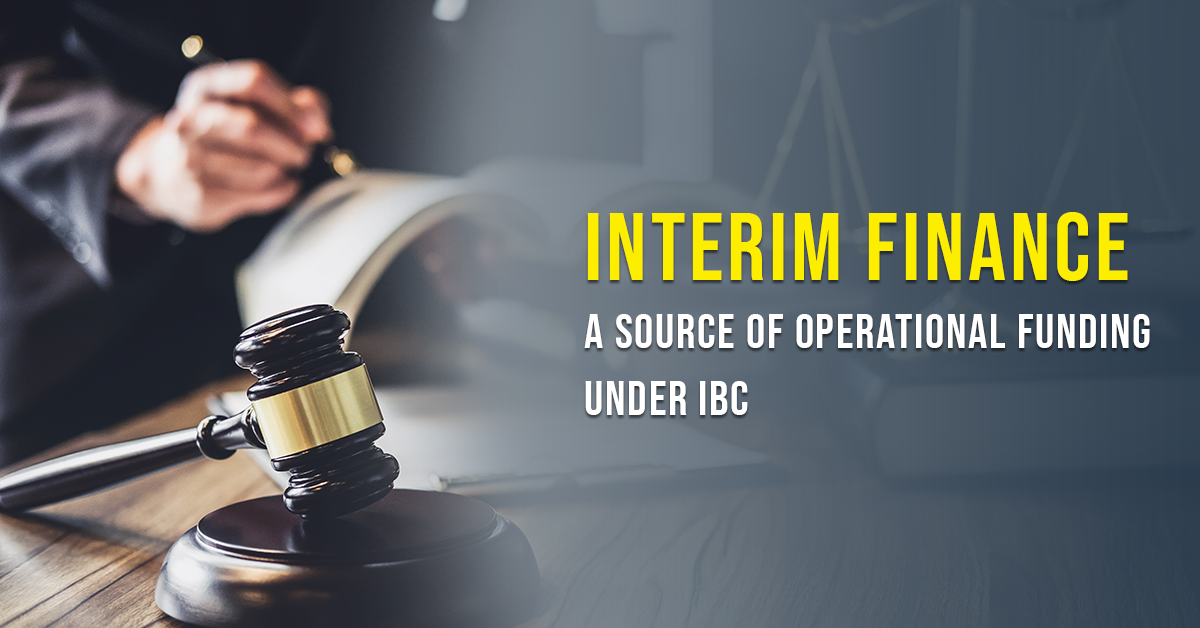Understanding Interim Finance in CIRP
The provision of interim finance plays a crucial role in the Corporate Insolvency Resolution Process (CIRP) under the Insolvency and Bankruptcy Code, 2016 (IBC). It allows insolvent companies to remain operational and covers the costs associated with the resolution process. This article explores the provisions, regulations, and relevant case judgments related to interim finance in the CIRP process.

I. Definition and Purpose of Interim Finance:
Interim finance refers to the financial debt raised by the Interim Resolution Professional (IRP) or Resolution Professional (RP) during the CIRP. Its purpose is to ensure that the insolvent company can continue its operations, meet its working capital requirements, and cover the costs of the resolution process.
II. Priority and Security Concerns:
Interim finance holds a higher priority than other creditors’ debts. According to the IBC, it is considered a part of the insolvency resolution process costs and takes precedence over other claims. However, the creation of security interest on encumbered assets of the corporate debtor requires the prior consent of creditors whose debt is secured by such assets.
Provisions and Regulations Governing Interim Finance in CIRP
I. Insolvency and Bankruptcy Code, 2016:
- Section 5(13): Definition of Insolvency Resolution Process Costs:
- This section defines insolvency resolution process costs, which include the amount of any interim finance and the costs incurred in raising such finance, fees payable to the resolution professional, expenses of running the business of the corporate debtor, costs incurred by the government, and other specified costs.
- Section 20: Management of Operations of Corporate Debtor as a Going Concern:
- This section empowers the IRP/RP to manage the operations of the corporate debtor as a going concern, including the authority to raise interim finance with the prior approval of the Committee of Creditors (CoC).
- Section 28: Approval of Committee of Creditors for Certain Actions:
- This section requires the approval of the CoC for actions such as raising any interim finance beyond the amount decided by the CoC and creating security interest over the assets of the corporate debtor.
- Section 52: Secured Creditor in Liquidation Proceedings:
- This section allows secured creditors in liquidation proceedings to relinquish their security interest and receive proceeds from the sale of assets, with the amount of insolvency resolution process costs deducted from the realization.
- Section 53: Distribution of Assets:
- This section specifies the order of priority for the distribution of proceeds from the sale of liquidation assets, with insolvency resolution process costs being paid in full before other claims.
II. Insolvency and Bankruptcy Board of India (Insolvency Resolution Process for Corporate Persons) Regulations, 2016:
- Regulation 29: Sale of Assets Outside the Ordinary Course of Business:
- This regulation allows the resolution professional to sell unencumbered assets of the corporate debtor if it is necessary for better realization of value, with the approval of the CoC.
- Regulation 31: Insolvency Resolution Process Costs:
- This regulation specifies various costs included in insolvency resolution process costs, such as amounts due to suppliers of essential goods and services, fees of the authorized representative, expenses incurred by the IRP/RP, and other directly related costs approved by the committee.
Case Laws/ Judgments on Interim Finance and CoC’s Contribution
I. NCLT Mumbai-I (31.10.2018) in Aqua Omega Services Pvt. Ltd. vs Great United Energy Pvt. Ltd. [MA 986/2018 IN CP (IB)-2104/MB/2018]:
- In this case, the NCLT Mumbai held that as per Regulation 33 and Regulation 34, it is the responsibility of the Committee of Creditors (CoC) to make the payment of the Resolution Professional’s costs. The sole financial creditor, ICICI Bank, was directed to make the payment of the Resolution Professional’s cost along with the IRP expenses, which was ratified by the CoC.
II. NCLAT (10.01.2020) in Committee of Creditors M/s. Smartec Build Systems Pvt. Ltd. Vs B. Santosh Babu & Ors. [Company Appeal (AT) (Insolvency) No. 48 of 2020]:
- The NCLAT agreed with the observations made by the Adjudicating Authority that the CoC is responsible for paying the fees and costs incurred by the Interim Resolution Professional (IRP) beyond 30 days until the date of liquidation if the IRP is not allowed to continue as the Liquidator.
III. NCLAT (10.12.2020) in Newogrowth Credit Pvt. Ltd. Vs. Resolution Professional, Bhaskar Marine Services Pvt. Ltd. & Ors. [Company Appeal (AT) (Insolvency) No. 1053 of 2020]:
- In this case, the NCLAT held that a CoC member is required to bear their share of the CIRP cost in proportion to their voting share and the period they were a member of the CoC.
Practical Challenges and Proposed Solutions
I. Reluctance of CoC in Approving Interim Finance:
- In many cases, the CoC may be reluctant to approve interim finance, which puts the IRP/RP in a challenging situation. The IRP/RP has statutory duties to carry out under the Code but relies on the CoC’s approval for crucial funding.
II. Enabling Provision for the Largest Voting Share Financial Creditor to Provide Interim Finance:
- To address the challenge of obtaining interim finance, there should be an enabling provision, similar to Regulation 2A of the Liquidation Process Regulations, that designates the financial creditor with the largest voting share to provide interim finance. The estimated amount, with interest, can be determined by the IRP/RP and the interest rate can be set at SBI MCLR + 2%.
Conclusion:
Interim finance is a vital source of operational funding during the CIRP process. The IBC and related regulations provide provisions and regulations for the management and prioritization of interim finance. The discussed case judgments shed light on instances where CoC members were asked to contribute to CIRP costs. However, challenges remain, such as the reluctance of CoC in approving interim finance. Introducing an enabling provision for the largest voting share financial creditor to provide interim finance can help overcome these challenges and ensure adequate funding during the resolution process.
External Article Links:
- Aqua Omega Services Pvt. Ltd. vs Great United Energy Pvt. Ltd. Case Judgment
- Committee of Creditors M/s. Smartec Build Systems Pvt. Ltd. Vs B. Santosh Babu & Ors. Case Judgment or Click here
- Newogrowth Credit Pvt. Ltd.Vs.Resolution Professional, Bhaskar Marine Services Pvt. Ltd. & Ors. Case Judgment










